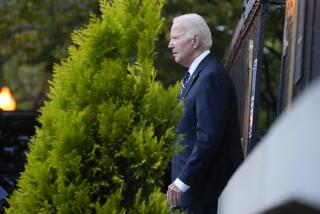Panetta tells Senate panel he’ll examine the effectiveness of coercive interrogation
- Share via
WASHINGTON — President Obama’s nominee to head the CIA, Leon E. Panetta, said Friday that he intended to test the claims by current agency officials that coercive interrogation methods were effective in getting terrorism suspects to talk.
Panetta’s comments were the latest indication that the Obama administration may restore some of the CIA’s authority to use interrogation techniques that go beyond those allowed for the U.S. military.
But Panetta emphasized that he would also examine the downside of using coercive methods, and that the agency would operate within the law.
The question of whether coercive methods work has become a heated issue within the intelligence community. President Obama last month signed executive orders to abolish harsh interrogation methods and close the U.S. prison at Guantanamo Bay, Cuba.
Critics contend that prisoners under duress yield bad intelligence. But outgoing CIA Director Michael V. Hayden has argued that the agency’s “enhanced” interrogation techniques were highly effective against Al Qaeda prisoners, and that the agency should be allowed to continue using those methods as long as they comply with the law.
Panetta said that as part of a White House task force on interrogation policy, he would examine the agency’s tactics and results in the aftermath of the Sept. 11 attacks, seeking to determine “how effective they were or weren’t and whether any appropriate revisions need to be made.”
Panetta’s comments came during the second day of his confirmation hearing before the Senate Intelligence Committee. Panetta also testified that he believed the Bush administration’s controversial counter-terrorism methods had undermined the nation’s security.
“I think sometimes they believed that the ends justified the means,” Panetta said.
“Our greatest weapon is our moral authority,” he added later, and “the sense that we were willing to set that aside, I think, did damage our security.”
Panetta, a former California congressman and chief of staff to President Clinton, is expected to be confirmed next week as CIA director, completing Obama’s national security team.
In two days of hearings, Panetta promised a clean break with Bush administration policies, even while preserving the CIA’s latitude to resume certain aggressive tactics.
Panetta testified Thursday that the simulated drowning technique known as waterboarding was torture. But the CIA has used other methods over the last eight years -- such as manipulation of a detainee’s sleep schedule -- that Obama could opt to reinstate if they are deemed legal.
In a meeting last month with reporters, Hayden said that much of the CIA’s intelligence on Al Qaeda for several years after the Sept. 11 attacks came from prisoners who were subjected to “enhanced” methods. He said it was legitimate to question whether such methods were appropriate but scoffed at claims that they were ineffective.
“You can’t say it didn’t work,” he said. “It worked.”
Panetta retracted the assertion he made Thursday that the CIA had sent prisoners to other countries to be tortured. He also clarified the Obama administration’s stance on the use of so-called “renditions,” or secret transfers of prisoners to other countries.
The agency will no longer send prisoners to its own secret detention sites, which are being closed, Panetta said.
But “there is a second kind of rendition, where individuals are turned over to a country for purposes of questioning,” he said. “There were efforts by the CIA to seek and to receive assurances that those individuals would not be mistreated.”
Panetta made it clear that those renditions could continue, largely unchanged from Bush-era policies.
“Using renditions, we may very well direct individuals to third countries,” Panetta said. “I will seek the same kinds of assurances that they will not be treated inhumanely.”
--
More to Read
Get the L.A. Times Politics newsletter
Deeply reported insights into legislation, politics and policy from Sacramento, Washington and beyond. In your inbox twice per week.
You may occasionally receive promotional content from the Los Angeles Times.










